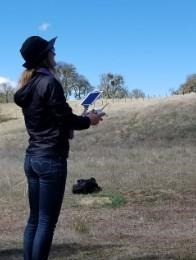By Sean Hogan and Brandon Stark et.al
Since the Part 107 Remote Pilot Certification for regulation of
non-recreational use of small unmanned aerial systems (sUAS - aka. drones) was added to the FAA's Code of Federal Regulations (CFR) in mid-2016, there have been a number of updates to the rules over the years, including an Academic Exemption for education and research purposes (which is only apply to institutions of higher education and not other state agencies or conservation groups). The most recent of these updates occurred in January 2021, when the regulations were further amended to allow for the operation of drones during the night and over people in limited circumstances. For some operators, these have been very welcome changes. However, maybe more widely relevant to our community of drone enthusiasts, in June 2021 the FAA announced the requirement of "The Recreational UAS Safety Test" (TRUST) for all recreational pilots; with the objective of ensuring that these pilots are likewise knowledgeable in the FAA's rules and regulations for drone operations.

Amidst these updates and changes to the regulations, a common question that IGIS receives is "what do I need to do to legally fly a drone?" To answer this question, the head of our UC System's Center of Excellence on Unmanned Aircraft System Safety (UASSafety), Dr. Brandon Stark, has provided the following simplified guidelines to help steer people in the right directions, for whether they need the TRUST and/or Part 107 certifications:
- Coursework -> TRUST
- Research in access-controlled field -> TRUST
- Research in public area with people -> Part 107
- Collection of data for another agency -> Part 107
- Promotional media -> Part 107
- Demonstration for students -> TRUST
- Demonstration for non-students -> Part 107
- Inspecting any structure for repairs -> Part 107
- Flying above the FAA's Facility Map Altitude -> Part 107
- Flying above 400 ft (AGL) -> Part 107
- Any operation that could profit the pilot in any way -> Part 107
- Strictly for fun (even if you have a Part 107 certification) -> TRUST
Note - The Academic Exception is not a loophole. Everyone now needs to have either completed a TRUST or Part 107 certification, and preferably both.
For the sake of drone operators everywhere, it is extremely important that we all abide by these rules and regulations; as it could take only one grievous mistake (even if the mistake is unwitting) to legally set back all of the progress that has been made for the allowance of sUAS operations, both within and outside of the UC System.
Source : ucanr.edu